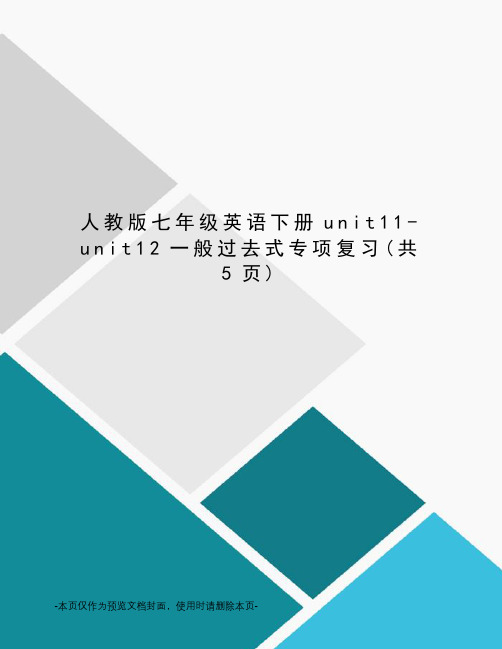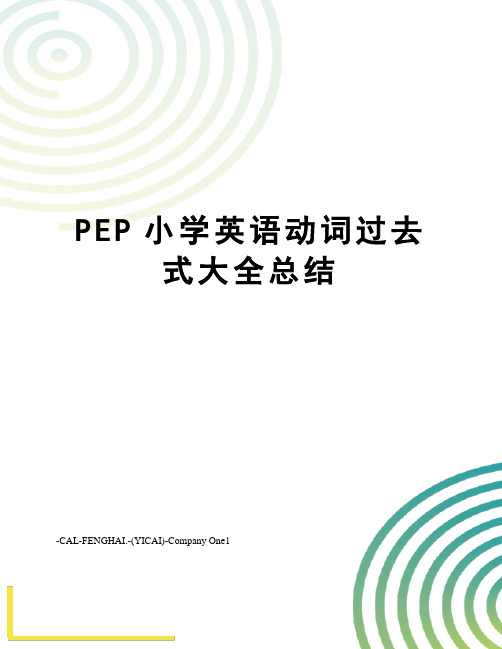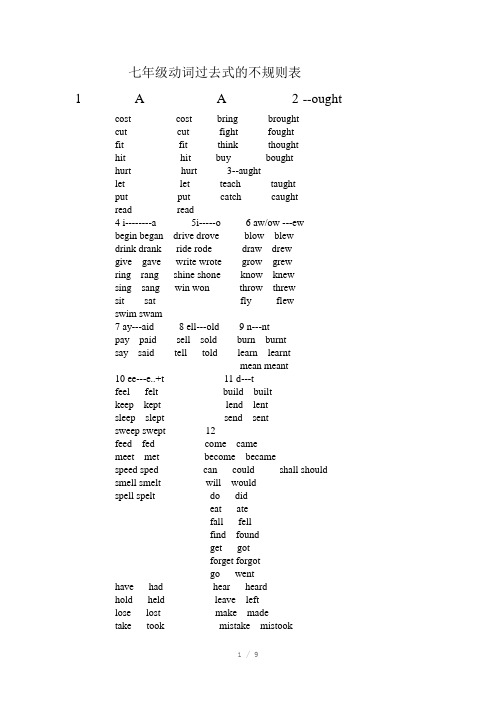Book11动词复习课过去式
英语动词过去式练习题

英语动词过去式练习题一写出下列动词的过去式is\am_________ fly_______ plant________ are ________drink_________ play_______ go________ make ________does_________ dance________ worry________ ask _____taste_________ eat__________ draw________ put ______throw________ kick_________ pass_______ do ________Be动词的过去时练习二 1. I _______ at school just now.2.3.4.5. He ________ at the camp last week. We ________ students two years ago. They ________ on the farm a moment ago. Yang Ling ________ eleven years old last year.6. There ________ an apple on the plateyesterday.7. There ________ some milk in the fridge on Sunday.8. The mobile phone _______ on the sofa yesterday evening.三句型转换1.It was exciting.否定句:________________________________________________一般疑问句:____________________________________________肯、否定回答:__________________________________________2. All the students were very excited.否定句:________________________________________________一般疑问句:____________________________________________肯、否定回答:__________________________________________3. They were in his pocket.否定句:________________________________________________一般疑问句:____________________________________________肯、否定回答:__________________________________________一、用be动词的适当形式填空1. I ______ an English teacher now.2. She _______ happy yesterday.3. They _______ glad to see each other last month.4.5.6.7. Helen and Nancy ________ good friends. The little dog _____ two years old this year. Look, there ________ lots of grapes here. Today _____ the second of June. Yesterday ______ the first of June. It _____ Children’s Day. All the students ______ very excited.二、句型转换1. There was a car in front of the house just now.否定句:________________________________________________一般疑问句:____________________________________________肯、否定回答:__________________________________________肯、否定回答:__________________________________________三、中译英1.我的故事书刚才还在手表旁边。
小学英语过去式复习课件

____________________________________ • 8. He wait for you three hours ago.
____________________________________ • 9. Who find it just now ? ________________________________________
run→ran know→knew win→wonspeak→spoketake→took write→wrote get→got • 2、变词尾的–d 为–t ; build→built lend→lent send→sent spend→spent bend→bent • 3、与动词原形一样; cut→cut put→put cost→cost hurt→hurt shut→shut • 4、变-ay 为-aid (少数动词); say→said pay→paid lay→laid • 5、采用不同词根;sell→sold teach→taught buy→bought • 6、其他。如:am/is→was are→were have/has→had do→did
小学英语 一般过去时
一、概念
• 表示在的过去某个时间里所发生的动作或存在的状态。通常在 句子里找到表示过去时间的词或词组。
• 如:yesterday,yesterday morning,yesterday afternoon, yesterday evening,the day before yesterday(前天), last night,last week,last month, last year,a moment ago(刚才),just now(刚才), two days ago,a week ago,in 1990等。 如: I went to bed at eleven last night.昨 晚我11:00睡觉。
人教版七年级英语下册unit11-unit12一般过去式专项复习

人教版七年级英语下册u n i t11-u n i t12一般过去式专项复习(共5页)-本页仅作为预览文档封面,使用时请删除本页-Unit11-Unit12一般过去时态专题复习提纲一.重点词组(在横线处写出过去式)挤牛奶 milk a cow 骑马 ride a horse 喂鸡 feed chickens和农民谈话 talk with a farmer 拍照片 take some photos 乘公交车 take a bus带它们回家take them home 带某人在农场四周看看 show sb around the farm 摘草莓 pick some strawberries去钓鱼 go fishing 去划船 go boating 去电影院 go to the cinema去海边go to the beach 做家庭作业 do my homework 在湖边露营 camp by the lake打羽毛球 play badminton 在游泳池游泳 swim in a swimming pool 放风筝 fly a kite弹吉他 play the guitar 搭建帐篷 put up tents 为考试做准备 study for a test讲故事 tell stories 教英语 teach English 买礼物 buy some gifts逃跑 run away 坐在月亮下 sit under the moon 大吃一惊 get a terrible surprise把蛇叫醒 wake the snake up 看见花 see flowers 是 is/am are在超市购物shop in the supermarket eat hamburgers 感觉高兴 feel happy和朋友吃晚餐 have dinner with friends 捉鱼 catch many fish 开车去海边 drive to the beach找到些相当有趣的东西 find something really interesting二.用所给的适当形式填空。
人教英语 七下 Unit11 一般过去时态专项讲解 课件

My parents were at home last sunday.
上周日我父母在家。
二、与动词be的一般现在时一样,它在be动词的过去式was, were后面加
not即可变成否定句,并且was, were与not可以缩写成wasn't, weren't。
/ it /
在t, d 后面
needed /'ni:did/
/id/
清念 /t/, 元浊/d/;
/t/ /d/ 之后念/id/
• is∕a不m—规wa则s 的are动---w词er的e 过do∕去doe式s—:did
go—went
• have∕has—had take—took make— made
• 四、翻译下列句子,每空一词。
• 1. 你昨晚去哪了? Where ______ you _______ last night?
• 2. 我们昨天没有在学校。
• We __________ at school yesterday
• Homework
• 1、背诵动词过去式的规则变化规律。 • 2、抄记五遍不规则变化动词过去式的形式 • 3、预习sectionA1a-1c
Do you have breakfast? →Did you have breakfast? Yes, I do./No, I don’t. Yes, I did./No, I didn’t.
一、表示动作时,使用动词的过去式(looked,went,等)与一般现在时不 一样的是它没有人称和数的变化。
work play hope live stop trip
PEP小学英语动词过去式大全总结

P E P小学英语动词过去式大全总结-CAL-FENGHAI.-(YICAI)-Company One1PEP小学英语动词过去式大全总结三年级上册go- went 去 look-looked 看 eat-ate吃三年级下册meet-met 遇见 see-saw 看 come-came 来 watch-watched 观看draw-drew 画画 jump-jumped跳 open-opened 打开 taste-tasted 品尝 play-played 玩feed-feed(fed)喂养四年级上册go-went 去 please-pleased 请 have-had 吃 pass-passed 传递use-used 使用四年级下册run-run 跑 get up-got up 起床 go to school-went to school 去学校go home-went home 回家 go to bed-went to bed *睡觉 wear-wore 穿put on-put on 穿上 close-closed 关 want-wanted想要 take-took 买【篇二】五年级上册know-knew 知道 fun-funned 逗笑 wait-waited 等待 do homework-did homework 写作业 watch-TV-watched TV 看电视 read books-read books 看书play-computer-did housework 做家务 cook the meals-cooked the meals 做饭empty the trash-emptied the flowers 浇花 sweep the floor-swept the floor 扫地 clean the bedroom-打扫教室 wash the windows-washed the windows 擦窗户make the bed-made the bed铺床 set the table-set the table 摆饭桌wash the clothes-washed the clothes 洗衣服 do the dishes-did the dishes 洗碗碟put away the clothes-put away the clothes收拾衣服 play chess-played chess 下棋tell-told 说 work-worked 工作 use a computer-used a computer 使用计算机have a try-had a try 试一试五年级下册do morning exercises -did morning exercises eat breakfast晨练eat breakfast-ate breakfast 吃早饭 have English class-had English class 上英语课play sports-played sports 实行体育运动 eat dinner-ate dinner 吃晚饭climb mountains-climbed mountains 爬山 go shopping-went shopping 购物go hiking-went hiking 去远足 play the piano-played the piano 弹钢琴visit grandparent-visited grandparent 看望(外)祖父母 fly kites-flew kites 放风筝plant trees-planted tress 种树 make a snowman-made a snowman 堆雪人 swim-swan 游泳skate-skated 滑冰 sleep-slept 睡觉 draw pictures-drew pictures 画画cook dinner-cooked dinner 做饭read a book-read a book 看书answer the phone-answered the phone 接电话 listen to music-listened the music 听音乐 clean the room-cleaned the room 打扫房间 write a letter-wrote a letter 写信write an e-mail-wrote a letter 写电子邮件fly-flew 飞 jump-jumped 跳 walk-walked 走 run-ran 跑 climb-climbed 往上爬fight-fought 打架 swing-swang 荡秋千take-took 讲话 drink water-drank water喝水 send-sent 寄 take picture-took pictures 照相watch insects-watched insects 观察昆虫 pick up leaves-picked up leaves 采摘树叶do an experiment-did an experiment 做实验 catch butterflies-caught butterflies 捉蝴蝶count leaves-collected leaves 收集树叶 write a report-wrote a report 写报告play chess-played chess下棋【篇三】六年级上册go to school-went to school 上学 stop-stopped 停 get to-got to到达 find-found 寻找wait-waited 等 remember-remembered 记住 mean-meant 意思是drive-drove 驾驶buy-bought 购买 turn-turned 转弯 get off-got off 下车 ride a bike-rode a bike 骑自行车dive-dived跳水 live-lived 居住 teach-taught 教 go-went 去play the violin-played the violin 拉小提琴 make kites-made kites 制作风筝collect stamps-collected stamps 集邮 design-designed 设计say-said 说六年级下册Think-thought 思考 study-studied 学习 kick-kicked 踢 bounce-bounced 反弹 do-didgo swimming-went swimming 游泳 go fishing-went fishing 钓鱼study-studied 学习learn-learned 学习 sing-sang唱歌 dance-danced 跳舞 row-rowed 划(船)go skiing-went skiing 去滑雪 leave-left 离开 hear-heard 听见trip-tripped 旅行have a fever 发烧 hurt-hurt 疼痛 have a cold-had a cold 伤风 have a toothache-had a toothache 牙疼 have a headache-had a headache 头疼have a sore throat-had a sore throat 喉咙疼。
unit11 一般过去时语法课件Grammar

Exercises
A 3.He always _____me last term. A. helped B. helps C. helping D. help
remember 1.____ you ________ (remember) to Did buy the oranges? invented 2.Who ________ (invent) the computer. went 3.We _____ (go) to the cinema last night. The film _____ (be) very good. was did get 4.What time ____ you ____ (get) to school this morning? 5.Jim ___ (do) a lot yesterday. He did ____ (go) shopping and ______ (cook) went cooked supper.
He played tennis last week. He did not play tennis last week. Did he play tennis last week.
一般过去时的特殊疑问式 疑问词+did+主语+动词原形……? They finished their work at four. B A
我今年12岁. am I ___ 12 years old this year. 我去年11岁. was I ____ 11 years old last year. 他现在在北京。 is He ____ in Beijing now. 他昨天在上海。 was He ____ in Shanghai yesterday.
人教版初中英语七年级下册unit 11 过去式 知识点讲解与练习

人教版初中英语七年级下册unit 11 过去式知识点讲解与练习语法:一般过去时一、什么是一般过去时?一般过去时是用于表述“过去”的时态。
1. 表示过去发生的动作。
2. 表示过去发生的状态。
二、一般现在时与一般过去时的共同点一般过去时的句式在结构上与一般现在时的句式结构是完全相同的。
无论是陈述句还是疑问句均是如此。
因而学好了一般现在时的知识,再学习一般过去时的知识是非常容易的。
一、be动词。
1)肯定句。
I am a student. —> I was a student.You are young. —> You were young.2)否定句。
I am not a student. —> I was not a student.You are not young. —> You were not young.二、实意动词作谓语的情况。
1)肯定句。
I read books in the park. —> I read books in the park.(思考:为何看上去这个例句没有发生任何变化呢?答:因为read的过去式也为read,其拼写虽相同,但读音不同。
)He usually gets up at 7 a.m.—> He usually got up at 7 a.m.(注意:一般过去时中没有所谓的“三单变化规则”,因为一般过去时是没有人称和数的变化的)She helps me with my homework.—> She helped me with my homework.They want to ask you a question.—> They wanted to ask you a question.总结:此类结构中,将单独作谓语的实意动词变为其过去式,句子的时态即变成了一般过去时。
(实意动词单独作谓语的一般过去时没有人称和数的变化。
七年级动词过去式的不规则表

七年级动词过去式的不规则表1 A A2 --oughtcost cost bring broughtcut cut fight foughtfit fit think thoughthit hit buy boughthurt hurt 3--aughtlet let teach taughtput put catch caughtread read4 i--------a 5i-----o 6 aw/ow ---ewbegin began drive drove blow blewdrink drank ride rode draw drewgive gave write wrote grow grewring rang shine shone know knewsing sang win won throw threwsit sat fly flewswim swam7 ay---aid 8 ell---old 9 n---ntpay paid sell sold burn burntsay said tell told learn learntmean meant10 ee---e..+t 11 d---tfeel felt build builtkeep kept lend lentsleep slept send sentsweep swept 12feed fed come camemeet met become becamespeed sped can could shall shouldsmell smelt will wouldspell spelt do dideat atefall fellfind foundget gotforget forgotgo wenthave had hear heardhold held leave leftlose lost make madetake took mistake mistookstand stood understand understoodsee saw wake woke初中英语语法名词一可数名词1.单数形式常用a或者an来表示,a后接辅音音素而an后接元音音素.a book a pencil a ruler an apple an egg an ideaan old an unhappy boy a useful book an hour an honest boyan “A” “E”“F”“H”“I”“L”“M”“N”“O”“R”“S”“X”2.复数形式有规则变化和不规则变化规则变化有以下几条:(1)一般情况下在单数名词后直接加sa book two books(2)在以s,x,sh,ch字母结尾的单词后加esbus---buses box---boxes brush---brushes watch---watches(3)辅音字母加y结尾的词,把y改成ies,但元音字母加y的词则直接在单词后加s. baby—babies boy---boys(4)以f或fe结尾的词,把f或fe改成vesleaf---leaves knife---knives(5)以o结尾的词一般在单词后直接加s,但下列词要加eshero---heroes patato---patatoes tamato---tamatoes(6)复合名词的复数只要把最后一个名词变成复数就可以,但含有man/woman的复合名词,则两个名词都要变成复数.an apple tree------three apple treesa man teacher-----five men teachers不规则变化1 a—e man---men woman---women Frenchman--Frenchmen2 oo—ee foot---feet goose---geese tooth---teeth3单复数同形,注意这些词是可数名词people—people sheep---sheep deer---deer Chinese,English,Japanese4.child---children mouse---mice不可数名词1.肉类2.液体3调料4平时要多积累不可数名词有以下特点1.它没有单复数2 表示具体数量常用of结构a cup of tea a piece of news a bottle of milktwo cups of tea three bottles of milka box of apples five boxes of apples名词的修饰1.下列词修饰可数名词many许多a few有一些few很少,几乎没有,这些词后跟可数名词复数many books a few peoplefew apples2.下列词修饰不可数名词much 许多a little有一些little很少,几乎没有much milk a little water3.下列词既可以修饰可数名词复数又可以修饰不可数名词 alot of ,lots of ,plenty of ,some很多,一些a lot of apples andmilk4.orange room time名词所有格---的1.一般情况下在名词后加’s . Lucy---Lucy’s2.以s结尾的词加’.Teachers’ Day3.共同拥有的只要在最后一个词加’s后接单数名词.Lucy and Lily’s d esk而各自拥有的,则要在两个后都要加’s后接名词的复数Lucy’s and Lily’s desks4.of---的结构a map of China5.to--的结构the answer to the question ,the key to the door, a ticket to the movie6.双重所有格a friend of mine a book of my father’s冠词冠词分为不定冠词(a,an)和定冠词the下列情况下要用定冠词the1.表示特定的人或物.The girl under the tree is Lucy.2.表示说话人与听话人都熟悉的人或物.Lily is in the classroom.3.上文提到过的人或物.He gave me a book.The book is very good.4.表示世上独一无二的事物.the sun,the earth ,the moon5.普通名词构成的专有名词前.the Great Wall the Yellow River6.用在序数词,形容词的最高级和表示方位的名词前.the first ,the biggest,in theeast/south/west/north7.用在乐器名词前play the piano,play the violin8.用在姓名复数形式前,指一家人the Greens9.the加形容词表示一类人the poor the rich下列情况下不用冠词1.在有些专有名词前China2.名词前有作定语的限定词,如this,my,no,any,some This is my cat.3.季节月份星期及三餐前不用冠词.in spring ,on Sunday, have supper4.球类运动,棋类游戏前play soccer, play chess5.节日名词前May Day ,Children’s Day6.称呼语头衔或职务前Mr Green代词I we you he she it they 主格me us you him her it them 宾格我我们你,你们他她它(他她它)们my our your his her its their加名词my bookmine ours yours his hers its theirs不加名词我的我们的你(们)的他的她的它的(他.她,它)们的myself ourselves yourself/yourselves himself herself itself themselves我自己我们自己你(们)自己他自己她自己它自己(他.她,它)们自己1.主格作主语I am from China.2.宾格作宾语动词+宾格=动宾结构give me a book teach us English3.介词+宾格=介宾结构give this book to her It’s very kind of him to help us.4.enjoy oneself=have a good time learn by oneself=teach oneselflook after oneself=take care of oneself Help oneself (yourself/yourselves)to…by oneself say to oneself数词1.基数词和序数词one first six sixth eleven eleventhtwo second seven seventh twelve twelfththree third eight eighth twenty twentiethfour fourth nine ninth twenty-one twenty-firstfive fifth ten tenth2.分数=分子/分母分子用基数词,分母用序数词;当分子大于1,分母要用复数形式.1/3 one third 1/5 one fifth 1/2 a half 1/4 a quarter 2/3 two thirds 5/7 five sevenths3.dozen,hundred,thousand,million,billon的用法,如果这些词前有基数词或several,不能用复数形式;如果没有基数词或several,则这些词要用复数形式而且还要加上of.two dozen books , several hundred cars ,thousands of people4.时间表达方式0~30 分钟past 时钟30~60 分钟to下一个钟点o’clock整点1:10 ten past one 1:40 twenty to two 2:00two o’clock2:15 a quarter past two 2:45 a quarter to three3:30 a half past three 3:55 five to four5.编号Lesson One=the first lesson Room205 Class3,Grade7in the 1950s =in the nineteen fifties 在二十世纪五十年代in one’s twenties/thirties6.four-year-old four years old 100-meter raceTom is a four-year-old boy. Tom is four years old.形容词和副词一.形容词…的clever interesting popular fat1.形容词的构成名词+ly =形容词名词+ y =形容词名词+al =形容词friend+ly=frienly fun+y=funny person+al=personallove+ly=lovely sun+y=sunny nation+al=nationallive+ly=lively cloud+y=cloudy education+al=educational名词+ful =形容词名词+less =形容词名词+en =形容词hope+ful=hopeful hope+less=hopeless wood+en=woodenuse+ful=useful use+less=useless wool+en=woolenbeauty+ful=beautiful help+less=helpless gold+en=golden名词+ous=形容词动词+able=形容词danger+ous=dangerous change+able=changeablesafety safe count+able=countablecomfort+able=comfortable2.形容词的用法形容词+名词作定语系动词+形容词=系表结构作表语good boy be/look/sound/feel/smell/taste/become angry形容词作宾语的补足语keep the room clean二.副词…..地hard slowly1.副词的构成形容词+ly=副词slow+ly=slowly heavy+ly=heavilyhard,fast既是形容词又是副词hardly2副词的用法副词用来修饰动词run quicklygood taste good a good boy well sell well三形容词和副词的比较级和最高级的构成规则变化1.一般情况下在形容词和副词后加er,estclean---cleaner---cleanest2.辅音字母加y结尾的词把y改成ier,iestheavy---heavier---heaviest3.以辅音字母结尾的重读闭音节形容词双写最后一个辅音字母再加er,est big—bigger---biggest fat---fatter---fattest thin ,hot, wet4.部分双音节词和多音节词,在这些词前加more,mostpopular---more popular ---most popular不规则变化good/well---better---best bad/badly---worse---worstlittle---less---least far—farther/further—farthest/furthestold---older/elder---oldest/eldest (兄弟姐妹之间比较)many/much---more---most at least 最少at most 最多less than 少于more than=over 大于,超过my elder brother 我的哥哥my eldest brother我的大哥farther更远further更进一步四.形容词副词原级比较级最高级的用法.1原级的用法(1)as….as 与…一样He is as tall as Tom. He is running as quickly as Tom.(2)not as/so….as=less than 前者不如后者Tom is not as/so tall as YaoMing.(3)very/rather/quite very beautiful(3)基数词times as…as 倍数确Tom is three times as fat as Jim.3.比较级的用法(1)两者之间进行比较,常有than提示Who is taller,Maria or Jane? Jack is fatter than Tom.(2)下列词后常用比较级much,no ,a litter,any ,even, still,farmuch bigger a litter taller much more beautiful(3)比较级and比较级越来越…..bigger and bigger more and more popular(4)the 比较级…,the比较级….The more,the better.(5)同一范围内的比较比较级than any other 名词单数He is taller than any other boy in his class.比较级than the other名词复数He is taller than the other boys in his class.Beijing is bigger than any city in Japan.(不同范围的比较)(6)隐含比较Could you speak more slowly?最高级的用法(1)三者或三者以上之间进行比较Who is the tallest,Tom,Jim or LiMing?Tom is the thinnest of all.(2)the 序数词+最高级The Yellow River is the second longest river in China.(3)one of the比较级/最高级+名词复数Beijing is one of the biggest cities in the world.Tom is one of the taller boys.动词一非谓语形式Ving形式1.Ving形式的构成(1)一般情况下在动词后直接加ing. Look--looking(2)以不发音的e结尾的词去e后加ing.have—having see—seeing lie---lying die---dyingtie---tying(3)以辅音字母结尾的重读闭音节词,要双写最后一个辅音字母后加ing. Swim---swimming put---puttingrun,sit,slap,begin,cut,shop2.下列词后要加ingconsider/finish/keep/enjoy/like/love/mind/practice/goavoid/allow/No/do some+Vinggo swimming do some shopping finish readingallow doing be allowed to do sth3.介词要加ingat/in/on/of/off/up/for/by/with/without/about/before/afterfrom/upI am good at swimming. Don’t give up learning English.4.下列词组后要加ingfeel like/be busy/be worth/have fun/can’t(couldn’t)help /look forward to/pay attention to/make a contribution to/stay up(late)/find great pleasure in/have (some/no)trouble/difficulty5.作主语Swimming is good for your health.Open the door,please.6.作定语修饰名词swimming pool developing country动词不定式(to do)1.ask/tell/want/would like/warn/help/advise/encourage/teach/expect/allow/suggest后要加sb(not)to do sth2.plan/decide/begin/would like/want/try/learn/promise/refusecontinue/can’t wait/take turns后要加to do sth3.adj/adv +enough to do Tom is old enough to go to school.4.something/anything/nothing+adj to doI have something important to tell you.5.It’s adj of/for sb to do sth.It’s very kind of you to help me.It’s very important for you to learn English well.6.find/think/believe it +adj to do sthI find it difficult to learn English well.7.表示目的Tom jumped into the river to save that boy.8.do a lot of homework------a lot of homework to dolive in a house-----------a house to live in9.what/where/how/which/when+to do sthwhat to do/how to do sthI don’t know what to do. I don’t know how to do it.10.be glad/happy/pleased/nice/sad/sorry to doI am sorry to hear that. Glad to meet you.11.try/do one’s best to do sth12.can’t/couldn’t afford to do sth不带to的不定式既动词原形1.Why not/why+否定+主语后加不带to的不定式既动词原形Why not see a doctor?Why don’t you see a doctor?2.had better/had better not后加不带to的不定式既动词原形You had better stay in bed. You’d better not go to s chool now.3.make/let后加不带to的不定式既动词原形be made to do sthThis story made us laugh. Let’s go swimming now.Make you monitor make you happy4.Will/Would you please(not) 后加不带to的不定式既动词原形综合各种形式1.stop to do sth stop doing sth2.forget to do sth forget doing sth3.remember to do sth remember doing sth4.see/saw/watch/hear/heard +sb/sth+doing/do sthI often see her play soccer on the playground.When I got home,I heard her singing this song.5.get/be used to doing be used to do sth used to do sth used to be There used to be6.prefer doing to doing prefer to do sth rather than do sthwould rather do sth than do sthI prefer swimming to skating.I prefer to stay at home rather than go out for a picnic.二情态动词1.情态动词后加动词原形.2.can can’t could be able toI can play the piano.会,能I can’t swim. 不会He can’t be YaoMing, he is in the USA now.不可能I could play the guitar when I was ten years old.过去能Could you tell me something about China?有礼貌地提问I am able to swim. I was able to play the piano when I was 6.I will be able to fly to the moon one day.be able to应用于任何时态3.may maybe may beMay I help you? 可以The book may be on your desk.可能句中Maybe the book is on your book. 可能句首副词maybe=perhaps4. mu st must be mustn’t needn’t =don’t/doesn’t have toYou must go to school on time.必须主观I have to stay at home because I have got a bad cold.不得不客观This bike must be LinTao’s, his name is on it.一定是Must I finish my homework now?Yes,you must. No,you nee dn’t./No ,you don’t have to .不必You mustn’t play soccer on the street.不准5.needn’t+v原形don’t/doesn’t need to do sth时态名称意思结构现在进行时现在正在发生的动作am/is/are +ving now/at this momentI am doing my homework now. Jane is swimming at the moment.(now,listen,look,at the moment)过去进行时过去某个时刻正在发生的动作was/were+ving at this time yesterday at nine last night I was playing soccer at this time yesterday. Kangkang was watching TV at nine last night.一般将来时将要发生的动作will+v原形am/is/are going to+v原形tomorrow/next(week)/this/in2050/in two daysWe are going to Beijing tomorrow. She will have a birthday party next Monday.go,come,leave等词用现在进行时表示将来tomorrow/next(week)/this/in2050We are leaving for Japan the day after tomorrow.The summer holidays are coming.一般过去时过去发生的事或动作式常有下列词提示ago,just now,last week yesterday,the day before yesterday ,2000 过去式/didn’t+ v原形was/wereI was in Beijing last year. He played soccer just now.He didn’t play soccer just now. They were in the park two hours ago.一般现在时经常性或习惯性的动作当主语是第三人称单数且是肯定句时,动词要用第三人称单数形式.第三人称单数形式的构成(1)一般情况下在动词后加s look----looks(2)辅音字母加y结尾的把y变ies study----studies(3)以s,x,sh,ch,o 结尾加es guess—guessesMaria goes to school at 7:00 every day.Maria doesn’t go to school at 7:00 every d ay.Does Maria go to school at 7:00 every day?I often play soccer after class. They usually walk to school.arrive in Tom will arrive in Beijing tomorrow.arrive at Tom will arrive at Shanghang tomorrow.arrive When will Yao arrive?get to get home/here/there Tom will get to Beijing tomorrow.reach Tom will reach Beijing tomorrow.spend sb spend……on sth/(in)doing sthI will spend two hours on my homework.I will spend two hours doing my homework.tak e It takes sb…..to do sthIt took me 500yuan to buy this jacket.cost sth cost sb ….This bike cost me 600yuan.pay sb pay (….)forI paid 600yuan for this bike.---How long may I keep this book?---You can keep it for/about three days.---How soon will Tom arrive in Beijing?---In two weeks.---How often do you go swimming?---Twice a week./Sometimes.How many How much How fartime in time on time all the timeat the same time It’s time to do sth/It’s time for sthWhat’s the time?=What time is it?once twice three times four timesnever seldom sometimes=at times often usually always every..友情提示:范文可能无法思考和涵盖全面,供参考!最好找专业人士起草或审核后使用,感谢您的下载!。
